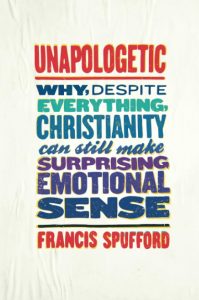 Summary: Maybe, at least for some, the right apologetic is not about logic, but emotion and experience.
Summary: Maybe, at least for some, the right apologetic is not about logic, but emotion and experience.
It would be hard to over emphasize how many people I respect have been fans of this book. It has been reviewed (and I think generally reviewed accurately) in Books and Culture (long), Christianity Today (short), the New York Times, the Telegraph and the Gospel Coalition (critical but appreciative). (Although not everyone likes it.)
The central idea of the book is that given our culture (and Spufford is writing to a secular UK here, not primarily to an Evangelical US) the idea that we should try to prove our Christianity through logic or proof is the wrong move.
As Alan Jacobs says in the opening of his review, apologetics should be more concerned with rhetoric than dialectical tasks, in other words, follow the interest of the listener, not your own desire to be right.
So Spufford is concentrating here on why, for him, Christianity can be an emotionally right choice, even if he can’t prove it scientifically or logically as many of the New Atheists are challenging Christians to do (or vice versa).
Spufford starts with trying to find the shared belief that we all have about this life. That central shared idea is HPtFtU, which stands for the Human Propensity to F*ck things Up (and he abbreviated most of the time.) Christians call this sin, but I think Spufford is right that calling it the HPtFtU feels more accurate. We can debate the reality or transmission method of original sin, but pretty much no one can debate that HPtFtU is real. We all have been a part of it and we all have seen others participate in it.
But he does not just describe it abstractly, he personalized it. He opens up with his own Propensity to F*ck his life and marriage up. And how in the end it was a transcendent moment that really turned him around. I think this early section has some brilliant writing, but also it a little bit too detached and so was a bit slower going because he does not approach things all that directly. He moves around them a bit. Part of this meandering is that he is culturally positioning his Christianity (and this positioning is where a number of North American Evangelicals will differ). So in his conception of faith he makes clear that he thinks Hell is metaphor not a reality, that much of our current hangups around homosexuality will eventually be moved passed like other cultural changes have, and to me most troubling is that his God is a more distant god than I really feel comfortable with.
The unapologetic really picks up when he retells the story of Jesus (Yeshua) in a way that only a talented fiction writer can. It hits the points that Spufford thinks are important and skims over some that he doesn’t. But that is what we all must do. A faith that has not been at least partially incorporated into our needs and personality and the culture of the world we live in will always not fit. Christianity will never completely fit, that is part of what Spufford (and a number of others) think shows that it is not simply something that we made up. Turning the other cheek, insisting that service is the method for greatness, understanding power as something that must be managed, but not rejected or used “˜for the greater good’ are concepts that humans that live with the HPtFtU would not create. But those things do something for us that is undeniable.
For those that have experienced the church’s own reality of the HPtFtU, there is more than a nod to you as well. Spufford’s wife is an Anglican priest. While he does not spend much time talking about his insights through her, it seems clear to me that the time he spends on the problems of the church with power, and abuse, and just generally sin, have much to do with his behind the scenes insights into the life of the church.
Unapologetic is not a grand slam for me. I think it was probably built up a little to high. I think some of the writing is a little too self aware. But this is a book that I will put on my read again list. I think I will be thinking about it for a while. Because like Spufford, it isn’t the logical or scientific arguments that do anything for my faith. It is my experience of past emotion and future potential that really ground my Christianity.
While some have left the church because of past issues, I have remained in the church in large part because of other issues. And that does not always feel like I have made a conscious choice to do that (or that it was something that I should be proud of because I stayed within the church), but instead a grace that allowed me to experience some things and be able to process others in a way that pushed me more toward the church instead of away. As I talk to friends that are in other places, I know that given some of their realities, I would probably have made similar decisions that they did.
I think that perspective places me in a very different space than if I felt my Christian faith was more dependent upon argument or rationalism. (I have faith because I don’t know, not because I do know.) So Unapologetic, gets much right for me personally as well as intellectually.
Unapologetic: Why, Despite Everything, Christianity Can Still Make Surprising Emotional Sense by Francis Spufford Purchase Links: Paperback, Kindle Edition




